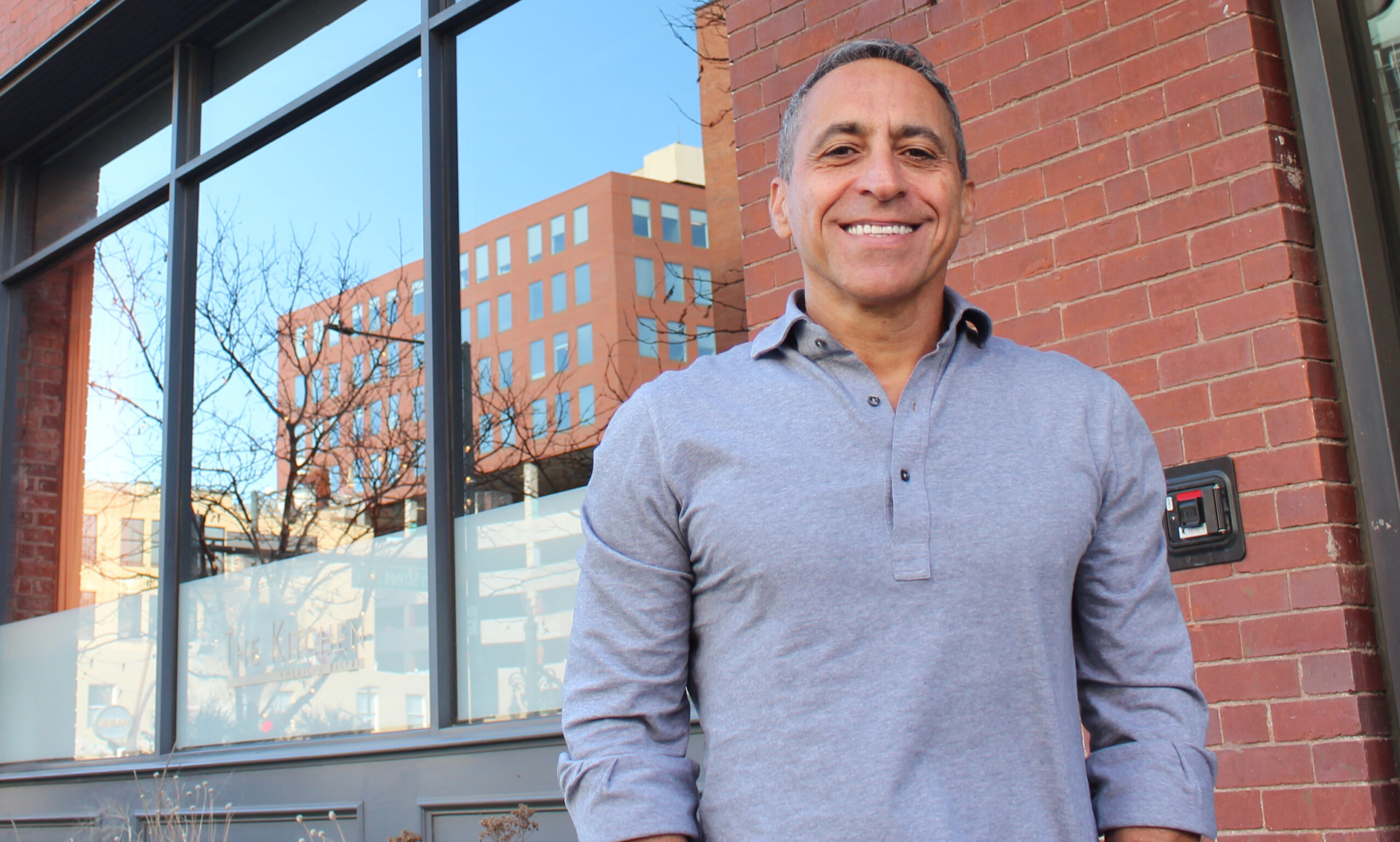
Payam Zamani bought about half of Inspirato in 2024 and is now the CEO. (Max Scheinblum/BusinessDen)
Payam Zamani is within striking distance of his turnaround at Denver-based travel club Inspirato.
Zamani, who bought about half the struggling company and became CEO in August, has cut costs, reduced waste and trimmed the portfolio of lavish rental properties around the globe.
“I believe the company got in its own way over the past few years,” he said. “It’s really an amazing team that needed better leadership.”
Inspirato, which leases high-end vacation homes for its members, endured Nasdaq delisting threats and its founders leaving and suing since a $87.5 million IPO in 2021.
Founded in 2011 by Denver brothers Brad and Brent Handler, the business saw a revenue boom through the pandemic, increasing from $166 million in 2020 to $346 million in 2023. But it has declined since, reporting $216 million through the first three quarters of 2024 compared to $258 million through nine months of 2023.
“When you grow fast, you shrink fast,” Zamani said, adding that Inspirato focused on short-term subscriptions and grew its rental portfolio during the “revenge travel” years following cancelled Covid trips.
He said that the post-pandemic boom in the hospitality industry caused false hope of a higher-demand norm. Chief Financial Officer Michael Arthur, who joined the company in 2023, said the company was burning $80 million a year to increase its portfolio of homes.
But now that the market has stabilized, both said Inspirato will soon be profitable, something each hopes to tout this Tuesday on the company’s earnings call.
“I’m a bit more old-school I think when it comes to operating a business,” Zamani said. “I think that growth without profits is kind of meaningless.”
Though the company lost $77 million during the first three quarters of 2023, filings show it only lost $6.1 million through the first three quarters of 2024.
Inspirato’s stock price closed at $4.50 on Wednesday. Arthur said that the price should sit somewhere in the $20-a-share range once the company’s balance sheet rebounds.
“We’ve said publicly that we’ll be profitable this year and we’ll likely be growing in 2026,” Arthur said. “Over the last two to three years since it’s been public, the only thing people have looked at is our cash burn and how much cash we have on our balance sheet. We think that’s gonna go away.”
Zamani professes “spiritual capitalism”
This isn’t Zamani’s first time leading a company.
In 1994, he founded Autoweb — one of the first online marketplace for cars — with his brother. Five years later, it IPO-ed for $1.2 billion.
While he’s run several other tech companies, Inspirato is his first time at the helm of a company he didn’t found. The 53-year-old said the $12.5 million he has put into Inspirato, which equates to a just over 50 percent ownership stake, gives him the founder’s mentality.
“That allows me to think of this business at a much more personal level than I would’ve otherwise,” he said. “If I’m just a CEO for hire, then I could just go to the next gig.”

Payam, his daughters Sophia and Ella and his wife Gouya at an event last year for his book, Crossing the Desert. (LinkedIn)
Zamani came to the United States in the late 1980s after fleeing his birth country of Iran. He and his family are Bahai, a religious minority persecuted after the Islamic Republic gained power in 1979. Bahai teaches the unity of humanity and all religions.
His faith informs how he runs his companies through a concept called “spiritual capitalism,” which Zamani coined. He views it as an alternative to the traditional, zero-sum approach to commerce.
“I fundamentally believe that the moment I look at other humans and spiritual beings having a temporary physical presence, the way I’m going to deal with them will be fundamentally different because I will no longer look at you simply as a token of economic value,” he said. “Most just want to maximize how much money I can make from you … but there’s a chance that I’m going to be dealing with you for more than just this physical life. So I’m going to treat you a lot differently.”
Zamani, his wife and two daughters live in the Bay Area, where Zamani has been since 1988.
Though he plans on hiring several more people in California, where his head of marketing and chief technology officer already are, he’s been spending three to four days a week in Denver. He said since the start of the year, he’s been in Colorado more than the Golden State.
Though all of those nights have been spent in hotels, Zamani plans to find something more permanent in Denver.
“I like the lifestyle of mountains, skiing, hiking, biking,” he said. “No one has to twist my arm to move here.”
Inspirato first got on Zamani’s radar through its president, David Kallery, who he worked with over two decades ago on a fledgling startup.
Zamani kept an eye on Inspirato. After buying around 10,000 shares in late 2023, he said he pinged Kallery, then chief operating officer, on LinkedIn.
“It looks like the company needs help. Let me know,” he recalled messaging him after noticing a dip in the stock price.
This past July, he finally heard back. Within weeks, Zamani was chairman and CEO of the company.
“This company represented an interesting puzzle that I wanted to solve,” he said. “And when I got here, I realized it was an easier puzzle than I thought because it’s a good company. It’s got a good infrastructure.”
Slow the burn
The first piece was a $40 million reduction in annual spending. Zamani said he and his team have largely done that through layoffs and cutting leases.
The day before he was announced as new CEO, Inspirato laid off 15 percent of its staff, which sits around 450 people, he said — down from the 750 it reportedly had in July 2023.
That and cutting $10 million in wasted software and marketing costs has helped save $25 million a year, he said.
But Zamani believes the most important change will come from refining its portfolio of 350 rental homes.
When he started in August, Inspirato trimmed 80 unprofitable locations. Half were in a cluster of 37 properties in New York.
“It was in the wrong part of the Hamptons. It was a bad, bad deal,” Zamani said. “They added them where no self-respecting Hamptons residents would call the Hamptons.”
Zamani said his Inspirato will be more intentional about which markets to enter. The company has vacation spots in every continent except Antarctica, including a coastal property in Mykonos, Greece — his favorite.

This Beaver Creek house costs $5,000 per night through Inspirato in March. The 9,000 square foot house has 6 beds and 6 baths.
“In the past, the company would have one home in a bunch of destinations. We’re not going to do that,” he said. In early January, the company announced it will lease more in Europe, the Caribbean, beach towns in the United States and various ski spots, including Telluride and Vail, most of which already have an Inspirato site.
“We (will) go to destinations where we can justify having a few homes because that density allows us to have some economies of scale,” he said. “When you don’t have that, then you’re almost guaranteed to lose money.”
Zamani is also refining and simplifying Inspirato’s membership structure.
Most of its 11,000-person base are part of the $5,500-a-year Club level, which gives them access to its network of homes. On each trip, Inspirato provides on-site concierge, daily housekeeping and pre-trip custom itineraries for its travelers, who still pay a nightly rate.
“You will always need vacations and need a place to vacation,” he said. “In a very uncertain world, this is a fairly reliable place to be.”
Zamani said Inspirato started offering only annual memberships in January, a change from prior emphasis on month-to-month short term subscriptions.
“You subscribe to Netflix, but you become a member of a country club,” he said. “Membership usually comes with more of an emotional attachment to that thing.”
Now, the company is shifting from cutting to reinvesting.
“You cannot cut your way to prosperity,” Zamani said. “You got to make sure that you have a plan ultimately for growing your business, and there are efficiency optimizations that come over a longer period of time like 12 to 24 months.”
One of the first initiatives is adding a 15 percent fee to the end of every trip bill. Zamani said they are doing that to avoid having to add line item charges for services like grocery delivery and housekeeping.
He also reinstated a five-day in-person work week at the company’s three-story Denver office at 1544 Wazee St.
“These days that’s not a very popular thing to say,” he said. “The first day I showed up here, you couldn’t tell if this company was still in business. Nobody was here.”
Better marketing and its tech platforms are also areas he’s eyeing growth.
He said by the end of February, Inspirato will add about 40 more people to its sales team and between 10 and 15 others across the board. Using these expanded teams to do more targeted advertising to book more trips is a key reason.

A four-bedroom house in Kohala Coast, Big Island, Hawaii in March rents for $3,400 per night.
“The way that we market our services to our members, how we make them aware of our availability, is one-size-fits-all,” he said of the current system.
Investing in algorithms that better target and plan trips for customers will be a boon for the bottom line, he added. If using them can help cut down on the time needed to acquire and book, then Inspirato can target more people.
Clash of eras
Zamani also hopes a legal spat between the founders, Brett and Brad Handler, and Inspirato will allow the company to move into a new era.
The Handlers sued the business in November after they were unable to book Inspirato vacations for free, a perk they granted themselves during their days running the company.
Zamani told BusinessDen in November that the benefit, which the Handlers created when they formed Inspirato, “gives them $138,000 of free travel at this point that will grow to maybe as much as $500,000 a year in the next 20 years.”
Brad was removed from the board in August and Brent, who was CEO through September 2023, resigned in September, according to the lawsuit.
SEC filings show that Brent still owns 9.3 percent of the company while Brad holds 3 percent of its stock.
“Just because I’m the CEO of the company today and I’m the largest shareholder doesn’t mean that if I leave tomorrow, I should get a lifetime free service from this organization,” Zamani said of the perk.
Weeks later, Inspirato countersued, claiming that the brothers cost the company $220 million through “negligent management and self-serving decisions,” court documents show. Zamani told BusinessDen in November that the perk needs to be “reviewed and retooled.”
The case is ongoing.
“I wished that the founders would have handled the opportunity to work with me and the management team differently. I have high respect for founders, and I’m a founder myself,” he said.

Payam Zamani bought about half of Inspirato in 2024 and is now the CEO. (Max Scheinblum/BusinessDen)
Payam Zamani is within striking distance of his turnaround at Denver-based travel club Inspirato.
Zamani, who bought about half the struggling company and became CEO in August, has cut costs, reduced waste and trimmed the portfolio of lavish rental properties around the globe.
“I believe the company got in its own way over the past few years,” he said. “It’s really an amazing team that needed better leadership.”
Inspirato, which leases high-end vacation homes for its members, endured Nasdaq delisting threats and its founders leaving and suing since a $87.5 million IPO in 2021.
Founded in 2011 by Denver brothers Brad and Brent Handler, the business saw a revenue boom through the pandemic, increasing from $166 million in 2020 to $346 million in 2023. But it has declined since, reporting $216 million through the first three quarters of 2024 compared to $258 million through nine months of 2023.
“When you grow fast, you shrink fast,” Zamani said, adding that Inspirato focused on short-term subscriptions and grew its rental portfolio during the “revenge travel” years following cancelled Covid trips.
He said that the post-pandemic boom in the hospitality industry caused false hope of a higher-demand norm. Chief Financial Officer Michael Arthur, who joined the company in 2023, said the company was burning $80 million a year to increase its portfolio of homes.
But now that the market has stabilized, both said Inspirato will soon be profitable, something each hopes to tout this Tuesday on the company’s earnings call.
“I’m a bit more old-school I think when it comes to operating a business,” Zamani said. “I think that growth without profits is kind of meaningless.”
Though the company lost $77 million during the first three quarters of 2023, filings show it only lost $6.1 million through the first three quarters of 2024.
Inspirato’s stock price closed at $4.50 on Wednesday. Arthur said that the price should sit somewhere in the $20-a-share range once the company’s balance sheet rebounds.
“We’ve said publicly that we’ll be profitable this year and we’ll likely be growing in 2026,” Arthur said. “Over the last two to three years since it’s been public, the only thing people have looked at is our cash burn and how much cash we have on our balance sheet. We think that’s gonna go away.”
Zamani professes “spiritual capitalism”
This isn’t Zamani’s first time leading a company.
In 1994, he founded Autoweb — one of the first online marketplace for cars — with his brother. Five years later, it IPO-ed for $1.2 billion.
While he’s run several other tech companies, Inspirato is his first time at the helm of a company he didn’t found. The 53-year-old said the $12.5 million he has put into Inspirato, which equates to a just over 50 percent ownership stake, gives him the founder’s mentality.
“That allows me to think of this business at a much more personal level than I would’ve otherwise,” he said. “If I’m just a CEO for hire, then I could just go to the next gig.”

Payam, his daughters Sophia and Ella and his wife Gouya at an event last year for his book, Crossing the Desert. (LinkedIn)
Zamani came to the United States in the late 1980s after fleeing his birth country of Iran. He and his family are Bahai, a religious minority persecuted after the Islamic Republic gained power in 1979. Bahai teaches the unity of humanity and all religions.
His faith informs how he runs his companies through a concept called “spiritual capitalism,” which Zamani coined. He views it as an alternative to the traditional, zero-sum approach to commerce.
“I fundamentally believe that the moment I look at other humans and spiritual beings having a temporary physical presence, the way I’m going to deal with them will be fundamentally different because I will no longer look at you simply as a token of economic value,” he said. “Most just want to maximize how much money I can make from you … but there’s a chance that I’m going to be dealing with you for more than just this physical life. So I’m going to treat you a lot differently.”
Zamani, his wife and two daughters live in the Bay Area, where Zamani has been since 1988.
Though he plans on hiring several more people in California, where his head of marketing and chief technology officer already are, he’s been spending three to four days a week in Denver. He said since the start of the year, he’s been in Colorado more than the Golden State.
Though all of those nights have been spent in hotels, Zamani plans to find something more permanent in Denver.
“I like the lifestyle of mountains, skiing, hiking, biking,” he said. “No one has to twist my arm to move here.”
Inspirato first got on Zamani’s radar through its president, David Kallery, who he worked with over two decades ago on a fledgling startup.
Zamani kept an eye on Inspirato. After buying around 10,000 shares in late 2023, he said he pinged Kallery, then chief operating officer, on LinkedIn.
“It looks like the company needs help. Let me know,” he recalled messaging him after noticing a dip in the stock price.
This past July, he finally heard back. Within weeks, Zamani was chairman and CEO of the company.
“This company represented an interesting puzzle that I wanted to solve,” he said. “And when I got here, I realized it was an easier puzzle than I thought because it’s a good company. It’s got a good infrastructure.”
Slow the burn
The first piece was a $40 million reduction in annual spending. Zamani said he and his team have largely done that through layoffs and cutting leases.
The day before he was announced as new CEO, Inspirato laid off 15 percent of its staff, which sits around 450 people, he said — down from the 750 it reportedly had in July 2023.
That and cutting $10 million in wasted software and marketing costs has helped save $25 million a year, he said.
But Zamani believes the most important change will come from refining its portfolio of 350 rental homes.
When he started in August, Inspirato trimmed 80 unprofitable locations. Half were in a cluster of 37 properties in New York.
“It was in the wrong part of the Hamptons. It was a bad, bad deal,” Zamani said. “They added them where no self-respecting Hamptons residents would call the Hamptons.”
Zamani said his Inspirato will be more intentional about which markets to enter. The company has vacation spots in every continent except Antarctica, including a coastal property in Mykonos, Greece — his favorite.

This Beaver Creek house costs $5,000 per night through Inspirato in March. The 9,000 square foot house has 6 beds and 6 baths.
“In the past, the company would have one home in a bunch of destinations. We’re not going to do that,” he said. In early January, the company announced it will lease more in Europe, the Caribbean, beach towns in the United States and various ski spots, including Telluride and Vail, most of which already have an Inspirato site.
“We (will) go to destinations where we can justify having a few homes because that density allows us to have some economies of scale,” he said. “When you don’t have that, then you’re almost guaranteed to lose money.”
Zamani is also refining and simplifying Inspirato’s membership structure.
Most of its 11,000-person base are part of the $5,500-a-year Club level, which gives them access to its network of homes. On each trip, Inspirato provides on-site concierge, daily housekeeping and pre-trip custom itineraries for its travelers, who still pay a nightly rate.
“You will always need vacations and need a place to vacation,” he said. “In a very uncertain world, this is a fairly reliable place to be.”
Zamani said Inspirato started offering only annual memberships in January, a change from prior emphasis on month-to-month short term subscriptions.
“You subscribe to Netflix, but you become a member of a country club,” he said. “Membership usually comes with more of an emotional attachment to that thing.”
Now, the company is shifting from cutting to reinvesting.
“You cannot cut your way to prosperity,” Zamani said. “You got to make sure that you have a plan ultimately for growing your business, and there are efficiency optimizations that come over a longer period of time like 12 to 24 months.”
One of the first initiatives is adding a 15 percent fee to the end of every trip bill. Zamani said they are doing that to avoid having to add line item charges for services like grocery delivery and housekeeping.
He also reinstated a five-day in-person work week at the company’s three-story Denver office at 1544 Wazee St.
“These days that’s not a very popular thing to say,” he said. “The first day I showed up here, you couldn’t tell if this company was still in business. Nobody was here.”
Better marketing and its tech platforms are also areas he’s eyeing growth.
He said by the end of February, Inspirato will add about 40 more people to its sales team and between 10 and 15 others across the board. Using these expanded teams to do more targeted advertising to book more trips is a key reason.

A four-bedroom house in Kohala Coast, Big Island, Hawaii in March rents for $3,400 per night.
“The way that we market our services to our members, how we make them aware of our availability, is one-size-fits-all,” he said of the current system.
Investing in algorithms that better target and plan trips for customers will be a boon for the bottom line, he added. If using them can help cut down on the time needed to acquire and book, then Inspirato can target more people.
Clash of eras
Zamani also hopes a legal spat between the founders, Brett and Brad Handler, and Inspirato will allow the company to move into a new era.
The Handlers sued the business in November after they were unable to book Inspirato vacations for free, a perk they granted themselves during their days running the company.
Zamani told BusinessDen in November that the benefit, which the Handlers created when they formed Inspirato, “gives them $138,000 of free travel at this point that will grow to maybe as much as $500,000 a year in the next 20 years.”
Brad was removed from the board in August and Brent, who was CEO through September 2023, resigned in September, according to the lawsuit.
SEC filings show that Brent still owns 9.3 percent of the company while Brad holds 3 percent of its stock.
“Just because I’m the CEO of the company today and I’m the largest shareholder doesn’t mean that if I leave tomorrow, I should get a lifetime free service from this organization,” Zamani said of the perk.
Weeks later, Inspirato countersued, claiming that the brothers cost the company $220 million through “negligent management and self-serving decisions,” court documents show. Zamani told BusinessDen in November that the perk needs to be “reviewed and retooled.”
The case is ongoing.
“I wished that the founders would have handled the opportunity to work with me and the management team differently. I have high respect for founders, and I’m a founder myself,” he said.


